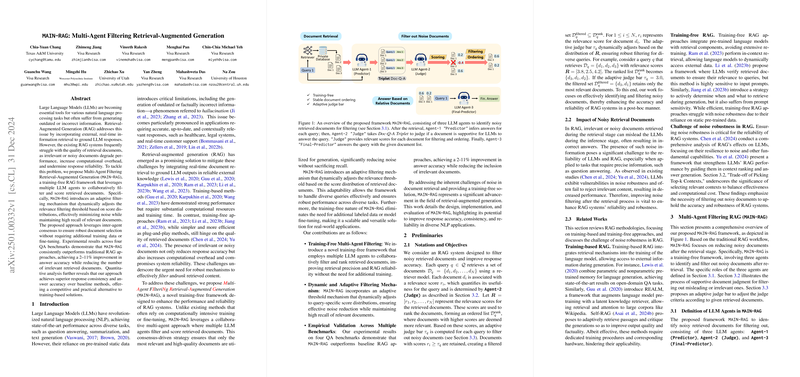MAIN-RAG: Multi-Agent Filtering for Retrieval-Augmented Generation
This paper presents the MAIN-RAG framework, a novel approach to improve the performance of Retrieval-Augmented Generation (RAG) systems by employing multi-agent filtering strategies. Retrieval-Augmented Generation (RAG) has become a significant methodology in natural language processing, effectively enabling LLMs to access and incorporate external data, thereby addressing issues related to outdated or inaccurate information generation. However, a persistent challenge within RAG systems is the quality and relevance of retrieved documents; irrelevant or noisy documents can significantly degrade performance by introducing inaccuracies and increasing computational load.
To tackle this challenge, the authors propose a training-free framework known as Multi-Agent Filtering Retrieval-Augmented Generation (MAIN-RAG). MAIN-RAG distinguishes itself by utilizing a collaborative multi-agent approach, leveraging multiple LLM agents to filter and score retrieved documents without necessitating additional training data or fine-tuning. The framework introduces an adaptive filtering mechanism that adjusts the relevance threshold dynamically based on score distributions. This means that MAIN-RAG can minimize noise while maintaining a high recall of relevant documents, making it versatile and scalable for practical applications.
The experimental results are robust, demonstrating MAIN-RAG's effectiveness across four well-known QA benchmarks. MAIN-RAG achieves a consistent 2-11% improvement in answer accuracy over traditional RAG systems. This is accomplished by reducing irrelevant document inclusion, thereby supporting increased answer accuracy and response consistency. These outcomes are significant as they provide a competitive and practical training-free alternative to existing training-based RAG solutions.
From a theoretical perspective, MAIN-RAG's multi-agent architecture enhances document selection efficacy through inter-agent consensus, bolstering RAG system reliability without needing the computational intensity associated with training and fine-tuning models. This system emphasizes the importance of dynamic, context-aware filtering in enhancing LLMs' performance and could pave the way for further innovations in the use of multiple agents to address similar challenges in other areas of AI and machine learning.
Future developments suggested by this research could extend the application of MAIN-RAG to additional NLP tasks beyond QA systems, potentially improving tasks that require dynamic information access and real-time processing. Furthermore, the underlying architecture of MAIN-RAG might inspire new multi-agent systems and adaptive filtering mechanisms, broadening the scope of retrieval-based AI technologies.
The implication of these findings underscores how adaptive, training-free systems can effectively harness the capabilities of LLMs while mitigating the risks associated with noise and irrelevant data. Continual refinement and application of such frameworks have the potential to significantly advance AI technologies, offering more reliable and accurate information processing across various domains.
